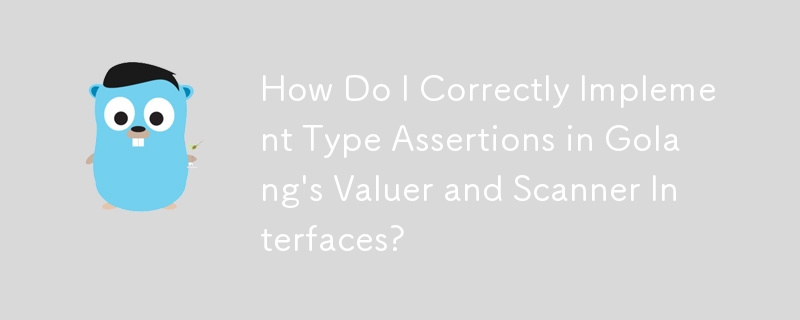Home >Backend Development >Golang >How Do I Correctly Implement Type Assertions in Golang's Valuer and Scanner Interfaces?
How Do I Correctly Implement Type Assertions in Golang's Valuer and Scanner Interfaces?
- Mary-Kate OlsenOriginal
- 2024-11-06 16:46:02555browse

Type Assertions in Golang: Troubleshooting Value and Scanner Implementations
When creating custom types in Golang, like the Role type in this case, it's common to implement the Valuer and Scanner interfaces for database driver compatibility. However, users can encounter errors when mishandling type assertions within these methods.
One such error is a type conversion issue while implementing the Scan method, as seen in the code excerpt:
func (r *Role) Scan(value interface{}) error {
r = (*Role)(value.(string))
return nil
}
The error stems from improperly assigning the converted string value to the dereferenced Role pointer (*Role). To resolve this, the correct syntax should be:
func (r *Role) Scan(value interface{}) error {
*r = Role(value.(string))
return nil
}
Additionally, it's recommended to check for conversion success using s, ok := value.(string) to avoid panics.
For the Value method, the signature is different from the provided code:
func (r Role) Value() (driver.Value, error) {
return string(r), nil
}
This Value implementation doesn't handle or produce NULL values.
By addressing these type assertion issues and implementing the interfaces correctly, you can seamlessly integrate custom types like Role with database operations in Golang applications.
The above is the detailed content of How Do I Correctly Implement Type Assertions in Golang's Valuer and Scanner Interfaces?. For more information, please follow other related articles on the PHP Chinese website!
Related articles
See more- Using Go language to connect to the database: improve application performance and efficiency
- In-depth understanding of golang framework
- How can I perform low-level disk I/O operations in Go for fine-grained control over disk access?
- How to achieve C-like byte array conversion and memory management in Go?
- How to Strip the .html Extension from File Names in a Go HTTP Server?

